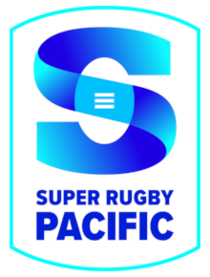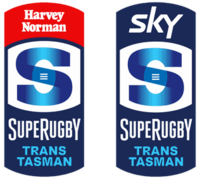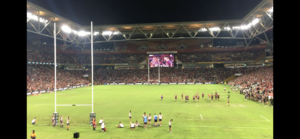Super Rugby facts for kids
 |
|
| Formerly | Super 12 (1996–2005) Super 14 (2006–2010) |
|---|---|
| Sport | Rugby Union |
| Founded | 1996 |
| Inaugural season | 1996 |
| Owner(s) | SANZAAR |
| CEO | Jack Mesley |
| No. of teams | 11 |
| Country | Australia (4 teams) Fiji (1 team) New Zealand (5 teams) Pacific Islands (1 team) Former: South Africa (8 teams) Argentina (1 team) Japan (1 team) Australia (1 team) |
| Most recent champion(s) |
Crusaders (2025, 13th title) |
| Most titles | Crusaders (13 titles) |
| TV partner(s) | Australia, Fiji, New Zealand and Papua New Guinea: Fijian Broadcasting Corporation National Broadcasting Corporation Sky Sport (Sky Open) Stan Sport (Nine Network) International: Canal+ Digicel (Pacific Islands) ESPN FloSports Premier Sports Asia Sky Italia Sky Sports SuperSport TSN Wowow |
| Sponsor(s) | SMARTECH Business Systems DHL Harvey Norman Shop N Save Supermarket |
| Related competitions |
Women's Competitions Super Rugby Women's Super Rugby Aupiki COVID-19 Regional Competitions: Super Rugby Aotearoa Super Rugby AU Super Rugby Trans-Tasman Super Rugby Unlocked |
| Official website | super.rugby |
Super Rugby is a top professional rugby union competition for men's teams. It includes teams from Australia, Fiji, New Zealand, and the Pacific Islands. In the past, teams from Argentina, Japan, and South Africa also played.
The competition began in 1996 as the Super 12. It had 12 teams from Australia, New Zealand, and South Africa. This built on older competitions like the South Pacific Championship from 1986. The Super 12 started after rugby became a professional sport in 1995.
The name changed to Super 14 in 2006 when two more teams joined. In 2011, it became simply Super Rugby as it grew to 15 teams. In 2016, teams from Argentina and Japan joined. However, some teams left the competition in 2018 and 2020.
The 2020 season was stopped because of the COVID-19 pandemic. Travel rules meant teams couldn't play internationally. So, Australia and New Zealand created their own tournaments: Super Rugby AU and Super Rugby Aotearoa. South African teams later left to join a different league.
In 2021, a new 12-team format was announced. It included the Fijian Drua and Moana Pasifika, a team from the Pacific Islands. From 2022, the tournament is called Super Rugby Pacific.
New Zealand teams have been very successful, winning 21 times in 28 years. The Crusaders have won the most titles, with 13 championships.
Contents
How the Tournament Works
What is SANZAAR?
SANZAAR is the group that manages Super Rugby. Its members are the rugby unions from Australia, New Zealand, South Africa, and Argentina. SANZAAR also runs The Rugby Championship, a tournament for national teams from Argentina, Australia, New Zealand, and South Africa. This group was formed in 1996 to create and manage the Super 12 and Tri-Nations tournaments.
Competition Rules
Before 2011, Super Rugby was a round-robin competition. Each team played every other team once. Teams earned four points for a win and two for a draw. They also got bonus points for scoring four or more tries, or for losing by seven points or less. The top four teams played in semi-finals, leading to a final match.
From 2011 to 2015, the format changed. Teams were grouped into conferences by country. Teams played others in their own conference twice. They also played some teams from other conferences. The finals included six teams: the top team from each conference and the next three best teams overall.
In 2016 and 2017, three new teams joined, making 18 teams. There were four conferences, and the finals had eight teams. After 2017, the competition became smaller again, with 15 teams. Two South African teams and one Australian team left.
Due to the COVID-19 pandemic, the competition changed again in 2020. It split into regional tournaments. Australia had Super Rugby AU, and New Zealand had Super Rugby Aotearoa. These were followed by Super Rugby Trans-Tasman in 2021, where Australian and New Zealand teams played each other. South African teams left the competition in 2020.
Since 2022, the tournament has gone back to a round-robin format with 12 teams. The Fijian Drua and Moana Pasifika teams joined. There are no separate divisions anymore. The top 8 teams at the end of the season play in the playoffs.
Each season since 2022 has also included a "Super Round." This is a weekend where all matches are played at one stadium. For example, the 2022, 2023, and 2024 Super Rounds were held at AAMI Park in Melbourne.
History of Super Rugby
Early Competitions
Before Super Rugby started in 1996, there were other rugby competitions in the southern hemisphere.
Super 6
The Super 6 started in 1992. It included three teams from New Zealand (Auckland, Canterbury, Wellington), two from Australia (Queensland, New South Wales), and the Fiji national team.
Super 10
In 1993, the Super 6 became the Super 10. This was because South Africa rejoined international sports. The Super 10 included teams from New Zealand, South Africa, Australia, and Western Samoa. The Transvaal team from South Africa won in 1993. The Queensland team from Australia won in 1994 and 1995.
The SANZAR Era: Super 12 (1995–2005)
Rugby became professional in 1995. This led to the creation of SANZAR (South African, New Zealand, and Australian Rugby). SANZAR started the Super 12 competition. It also created the Tri Nations Series for the national teams. The Super 12 helped rugby grow by getting a big TV deal.
The Super 12 began in 1996 with 12 teams: five from New Zealand, four from South Africa, and three from Australia. The Auckland Blues from New Zealand won the first two titles in 1996 and 1997.
The Canterbury Crusaders then won three years in a row from 1998 to 2000. In 2001, the ACT Brumbies from Australia won. The Crusaders won again in 2002 and 2005. The Brumbies won their second title in 2004. This was the last year of the 12-team format.
Super 14 (2006–2010)
In 2006, the competition expanded to 14 teams. Australia and South Africa each got one new team. The new Australian team was the Western Force from Perth. The new South African team was the Cheetahs.
The new teams struggled at first. The Western Force won only one game in their first season. The Crusaders won the 2006 title. In 2007, the final was between two South African teams for the first time: the Sharks and the Bulls. The Bulls won.
During the Super 14 era, only two teams won the tournament. The Crusaders won in 2006 and 2008. The Bulls won in 2007, 2009, and 2010.
Super Rugby: 15 Teams (2011–2015)
In 2011, the competition expanded to 15 teams and was renamed "Super Rugby." A fifth Australian team, the Melbourne Rebels, joined. The season was set up with three national conferences (Australia, New Zealand, South Africa). Teams played others in their own country twice and some teams from other countries once. The top six teams went to the finals.
Expansion: 18 Teams (2016–2017)
In 2016, Super Rugby grew to 18 teams. New teams from Argentina (Jaguares) and Japan (Sunwolves) joined. This expansion was partly because rugby sevens became an Olympic sport, increasing interest in rugby worldwide.
Smaller Competition: 15 Teams (2018–2020)
In 2018, Super Rugby became smaller again, with 15 teams. Two South African teams and one Australian team left the competition. The Sunwolves from Japan also left after the 2020 season.
COVID-19 and Changes (2020–2021)
The COVID-19 pandemic stopped the 2020 Super Rugby season. Because of travel rules, New Zealand and Australia started their own domestic tournaments. These were Super Rugby Aotearoa (New Zealand) and Super Rugby AU (Australia). South Africa also launched Super Rugby Unlocked.
In September 2020, South African teams decided to leave Super Rugby. They joined a different European competition. The Argentine Jaguares also left. In 2021, Super Rugby Trans-Tasman was played, where Australian and New Zealand teams competed against each other.
Super Rugby Pacific: New Era (2022–Present)
A new 12-team tournament, Super Rugby Pacific, started in 2022. The Fijian Drua and Moana Pasifika teams joined the five Australian and five New Zealand teams. The competition returned to a round-robin format with one main ladder. The top 8 teams play in the playoffs.
In 2024, the Melbourne Rebels team faced financial problems and was shut down by Rugby Australia. They did not play in the 2025 season. There are also talks about adding a team from the United States in the future.
Current Teams
There are currently 11 teams in Super Rugby Pacific. Four are from Australia, one from Fiji, five from New Zealand, and one represents the Pacific Islands. Each team represents a specific area.
|
|
| Club | City | Stadium | Capacity | First season |
|---|---|---|---|---|
| Auckland, Auckland Region | Eden Park | 50,000 | 1996 (Super 12) | |
| Canberra, Australian Capital Territory | GIO Stadium | 25,011 | 1996 (Super 12) | |
| Hamilton, Waikato | FMG Stadium Waikato | 25,800 | 1996 (Super 12) | |
| Christchurch, Canterbury | Apollo Projects Stadium | 17,104 | 1996 (Super 12) | |
| Suva, Fiji | Churchill Park HFC Bank Stadium |
10,000 15,446 |
2022 | |
| Perth, Western Australia | HBF Park | 20,500 | 2006 (Super 14) | |
| Dunedin, Otago | Forsyth Barr Stadium | 30,748 | 1996 (Super 12) | |
| Wellington, Wellington Region | Sky Stadium | 34,500 | 1996 (Super 12) | |
| North Shore, Auckland Region | North Harbour Stadium | 14,000 | 2022 | |
| Brisbane, Queensland | Suncorp Stadium | 52,500 | 1996 (Super 12) | |
| Sydney, New South Wales | Allianz Stadium | 42,500 | 1996 (Super 12) |
Former Teams
- Argentina:
 Jaguares – From Buenos Aires.
Jaguares – From Buenos Aires.
- Australia:
 Melbourne Rebels – From Melbourne. This team was withdrawn in 2024.
Melbourne Rebels – From Melbourne. This team was withdrawn in 2024.
- Japan:
 Sunwolves – From Tokyo. This team left in 2020.
Sunwolves – From Tokyo. This team left in 2020.
- South Africa:
 Bulls – From Pretoria.
Bulls – From Pretoria. Cheetahs – From Bloemfontein.
Cheetahs – From Bloemfontein. Griquas – From Kimberley.
Griquas – From Kimberley. Lions – From Johannesburg.
Lions – From Johannesburg. Pumas – From Mbombela.
Pumas – From Mbombela. Sharks – From Durban.
Sharks – From Durban. Southern Kings – From Gqeberha.
Southern Kings – From Gqeberha. Stormers – From Cape Town.
Stormers – From Cape Town.
Champions of Super Rugby
| Season | Teams | Champion | Score | Runner-up |
|---|---|---|---|---|
| 1996 | 12 | 45–21 | ||
| 1997 | 12 | 23–7 | ||
| 1998 | 12 | 20–13 | ||
| 1999 | 12 | 24–19 | ||
| 2000 | 12 | 20–19 | ||
| 2001 | 12 | 36–6 | ||
| 2002 | 12 | 31–13 | ||
| 2003 | 12 | 21–17 | ||
| 2004 | 12 | 47–38 | ||
| 2005 | 12 | 35–25 | ||
| 2006 | 14 | 19–12 | ||
| 2007 | 14 | 20–19 | ||
| 2008 | 14 | 20–12 | ||
| 2009 | 14 | 61–17 | ||
| 2010 | 14 | 25–17 | ||
| 2011 | 15 | 18–13 | ||
| 2012 | 15 | 37–6 | ||
| 2013 | 15 | 27–22 | ||
| 2014 | 15 | 33–32 | ||
| 2015 | 15 | 21–14 | ||
| 2016 | 18 | 20–3 | ||
| 2017 | 18 | 25–17 | ||
| 2018 | 15 | 37–18 | ||
| 2019 | 15 | 19–3 | ||
| 2020 | 15 (17) | Seasons cancelled (regional competitions were played instead) | ||
| 2021 | 10 | |||
| 2022 | 12 | 21–7 | ||
| 2023 | 12 | 25–20 | ||
| 2024 | 12 | 41–10 | ||
| 2025 | 11 | 16–12 | ||
Team Performance by Titles
| Team | Title(s) | Runners-up | Seasons Won | Seasons Runner-up |
|---|---|---|---|---|
| 13 | 4 | 1998, 1999, 2000, 2002, 2005, 2006, 2008, 2017, 2018, 2019, 2022, 2023, 2025 | 2003, 2004, 2011, 2014 | |
| 4 | 2 | 1996, 1997, 2003, 2024 | 1998, 2022 | |
| 3 | 0 | 2007, 2009, 2010 | — | |
| 2 | 4 | 2001, 2004 | 1997, 2000, 2002, 2013 | |
| 2 | 4 | 2012, 2013 | 2009, 2023, 2024, 2025 | |
| 1 | 2 | 2014 | 2005, 2008 | |
| 1 | 2 | 2016 | 2006, 2015 | |
| 1 | 1 | 2015 | 1999 | |
| 1 | 0 | 2011 | — | |
| 0 | 4 | — | 1996, 2001, 2007, 2012 | |
| 0 | 3 | — | 2016, 2017, 2018 | |
| 0 | 1 | — | 2010 | |
| 0 | 1 | — | 2019 |
Performance by Nation
| Nation | Titles | Runners-up | Total |
|---|---|---|---|
| 21 | 13 | 34 | |
| 4 | 6 | 10 | |
| 3 | 8 | 11 | |
| 0 | 1 | 1 |
Regional Competition Winners
Due to the COVID-19 pandemic, special regional tournaments were played in 2020 and 2021.
| Year | Super Rugby AU | Super Rugby Aotearoa | Super Rugby Unlocked | Super Rugby Trans-Tasman |
|---|---|---|---|---|
| 2020 | Brumbies | Crusaders | Bulls | N/A |
| 2021 | Reds | Crusaders | N/A | Blues |
Salary Cap Rules
Australia's Salary Cap
The Australian teams in Super Rugby have a salary cap. This means there's a limit on how much money they can spend on player salaries. For a squad of up to 40 players, the cap is A$5.5 million. This rule helps manage team finances. It also affects how Australian teams can sign and keep players.
Brand and Trophies
Super Rugby Trophies
Super Rugby has had different trophies over the years. The current trophy, used since 2011, is made of stainless steel. It weighs 18 kilograms and is 65 cm tall. Its design has three curved legs, representing the three original conferences: Australia (gold), New Zealand (black), and South Africa (green).
There are also other trophies played for during the season, like the Charles Anderson VC Memorial Cup and the Bob Templeton Cup. Each year, the Super Rugby player of the year award is also given out.
Super Rugby Logos
The Super Rugby logo has changed over time. The Super 14 logo used Roman numerals (XIV). The current Super Rugby logo has a large blue "S" with a white rugby ball. It also has "SupeRugbY" written below.
Naming Rights and Sponsors
Different companies sponsor Super Rugby in different countries, giving the competition different names.
- In New Zealand, Investec Bank sponsors the competition, so it's called Investec Super Rugby.
- In Australia, Vodafone is the main sponsor, making it Vodafone Super Rugby.
- In South Africa, Vodacom sponsors the competition, so it's known as Vodacom Super Rugby.
- In Argentina, Personal sponsors the competition, calling it Personal Super Rugby.
- In Japan, Mitsubishi Estate sponsored the competition, calling it Mitsubishi Estate Super Rugby.
Competition Records
Team Records
Single Match Records
- Highest score by one team: 96 points – Crusaders beat Waratahs 96–19 in 2002.
- Highest total score in a match: 137 points – Chiefs beat Lions 72–65 in 2010.
- Lowest total score in a match: 6 points – Highlanders beat Crusaders 6–0 in 2009.
- Biggest winning difference: 89 points – Bulls beat Reds 92–3 in 2007.
- Most tries in a match by both teams: 18 tries by Lions and Chiefs in 2010.
- Most tries by one team in a match: 14 tries by Crusaders (2002), Cheetahs (2016), and Lions (2017).
Season Records
- Most points scored in a season: 596 – Hurricanes in 2017.
- Fewest points scored in a season: 82 – Brumbies (2021) and Force (2021).
- Most wins in a season: 14 – Stormers (2012), Hurricanes (2015), Crusaders (2017), and Lions (2017).
- Most losses in a season: 13 – Lions (2010), Rebels (2011, 2017), Highlanders (2013), Force (2016), Southern Kings (2016), Sunwolves (2016), and Moana Pasifika (2023).
Player Records
Career Records
- Most Games Played: 202 – Wyatt Crockett (Crusaders).
- Most Points Scored: 1,708 – Dan Carter (Crusaders).
- Most Tries Scored: 66 – Sevu Reece (Crusaders).
Season Records
- Most Points in a Season: 263 – Morné Steyn (Bulls) in 2010.
- Most Tries in a Season: 16 – Joe Roff (Brumbies) in 1997 and Ben Lam (Hurricanes) in 2018.
Match Records
- Most Points in a Match: 50 – Gavin Lawless (Sharks) in 1997.
- Most Tries in a Match: 5 – Sean Wainui (Chiefs) in 2021 and Macca Springer (Crusaders) in 2025.
Other Rugby Competitions
Each country in Super Rugby also has its own local rugby leagues. These leagues help develop players for the Super Rugby teams.
- In South Africa, the Currie Cup is a major domestic competition.
- In New Zealand, the National Provincial Championship is the top local league.
- In Australia, the National Rugby Championship (NRC) started in 2014.
- In Japan, the Japan Rugby League One is the main domestic competition.
- In Fiji, the Skipper Cup features the country's top provincial teams.
Media Coverage
Super Rugby matches are broadcast around the world.
- In Australia, Nine Network and Stan Sport show the games.
- In South Africa, Supersport broadcasts the matches.
- In New Zealand, Sky Sport is the official broadcaster.
- Other channels like Canal+ (France), Digicel (Pacific Islands), ESPN (Americas), Premier Sports Asia (Asia), Sky Italia (Italy), Sky Sports (UK/Ireland), TSN (Canada), and Wowow (Japan) also show games.
- SANZAAR also has its own global streaming service, Sanzaarrugby.tv, for areas without a local broadcaster.
See also
 In Spanish: Súper Rugby para niños
In Spanish: Súper Rugby para niños
- List of Super Rugby champions
- List of Super Rugby stadiums
- SANZAAR
- Super Rugby Aotearoa
- Super Rugby AU
- Super Rugby Trans-Tasman
- Super Rugby Unlocked
- Super W
- Super Rugby Aupiki
 | Isaac Myers |
 | D. Hamilton Jackson |
 | A. Philip Randolph |







